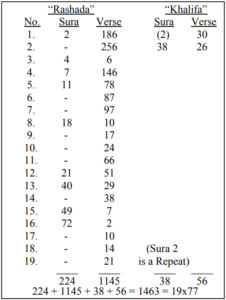Praise be to God! There is no other god except God.
The Quran is characterized by a unique phenomenon never found in any human authored book. Every element of the Quran is mathematically composed—the suras, the verses, the words, the number of certain letters, the number of words from the same root, the number and variety of divine names, the unique spelling of certain words, the absence or deliberate alteration of certain letters within certain words, and many other elements of the Quran besides its content. There are two major facets of the Quran’s mathematical system: (1) The mathematical literary composition, and (2) The mathematical structure involving the numbers of suras and verses. Because of this comprehensive mathematical coding, the slightest distortion of the Quran’s text or physical arrangement is immediately exposed.
Simple to Understand
Impossible to Imitate
For the first time in history we have a scripture with built-in proof of divine authorship—a superhuman mathematical composition.
For example, the total occurrence of the word “God” in the Quran is 2698, or 19×142. The total sum of verse numbers for all verses containing the word “God” is 118123, also a multiple of 19 (118123 = 19×6217).
Nineteen is the common denominator throughout the Quran’s mathematical system.
This phenomenon alone suffices as incontrovertible proof that the Quran is God’s message to the world. No human beings could have kept track of 2698 occurrences of the word “God,” and the numbers of verses where they occur. This is especially impossible in view of (1) the age of ignorance during which the Quran was revealed, and (2) the fact that the suras and verses were widely separated in time and place of revelation. The chronological order of revelation was vastly different from the final format. However, the Quran’s mathematical system is not limited to the word “God;” it is extremely vast, extremely intricate, and totally comprehensive.
The Simple Facts
Like the Quran itself, the Quran’s mathematical coding ranges from the very simple, to the very complex. The Simple Facts are those observations that can be ascertained without using any tools. The complex facts require the assistance of a calculator or a computer. The following facts do not require any tools to be verified, but please remember they all refer to the original Arabic text:
- The first verse (1:1), known as “Basmalah” consists of 19 letters. It’s constituent words occur in the Quran consistently in multiples of 19.
- The first word, “Ism” (Name) occurs 19 times.
- The second word “Allah” (God) occurs 2698 times (19×142)
- The third word “Al-Rahman” (Most Gracious) occurs 57 times, 19×3
- The fourth word “Al-Raheem” (Most Merciful) occurs 114 times, 19×6.
- The Quran consists of 114 suras, which is 19 x 6.
- The total number of verses in the Quran is 6346, or 19 x 334. [6234 numbered verses & 112 un-numbered verses (Basmalahs) 6234 + 112 = 6346] Note that 6 + 3 + 4 + 6 = 19.
- The Basmalah occurs 114 times, despite its conspicuous absence from Sura 9 (it occurs twice in Sura 27) & 114 = 19 x 6.
- From the missing Basmalah of Sura 9 to the extra Basmalah of Sura 27, there are precisely 19 suras.
- It follows that the total of the sura numbers from 9 to 27 (9 +10 +11 +12 +… + 26 + 27) is 342, or 19 x 18.
- This total (342) also equals the number of words between the two Basmalahs of Sura 27, and 342 = 19 x 18.
- The famous first revelation (96:1-5) consists of 19 words.
- This 19-worded first revelation consists of 76 letters 19 x 4.
- Sura 96, first in the chronological sequence, consists of 19 verses.
- This first chronological sura is placed atop the last 19 suras.
- Sura 96 consists of 304 Arabic letters, and 304 equals 19 x 16.
- The last revelation (Sura 110) consists of 19 words.
- The first verse of the last revelation (110:1) consists of 19 letters.
- 14 different Arabic letters, form 14 different sets of “Quranic Initials” (such as A.L.M. of 2:1), and prefix 29 suras. These numbers add up to 14 + 14 + 29 = 57 = 19 x 3.
- The total of the 29 sura numbers where the Quranic Initials occur is 2 + 3 + 7 +… + 50 + 68 = 822, and 822 + 14 (14 sets of initials) equals 836, or 19 x 44.
- Between the first initialed sura (Sura 2) and the last initialed sura (Sura 68) there are 38 un-initialed suras. 19 x 2.
- Between the first and last initialed sura there are 19 sets of alternating “initialed” and “uninitialed” suras.
- The Quran mentions 30 different numbers: 1, 2, 3, 4, 5, 6, 7, 8, 9, 10, 11, 12, 19, 20, 30, 40, 50, 60, 70, 80, 99, 100, 200, 300, 1000, 2000, 3000, 5000, 50,000, & 100,000. The sum of these numbers is 162146, which equals 19×8534.
This is a condensed summary of the Simple Facts.
The Literary Mathematical Composition
The Quran is characterized by a unique phenomenon never found in any other book; 29 suras are prefixed with 14 different sets of “Quranic Initials,” consisting of one to five letters per set. The table below shows the Quranic Initials and their suras:

So, fourteen letters, half the Arabic alphabet, participate in these initials. The significance of the Quranic initials remained a divinely guarded secret for 14 centuries. The Quran states in 10:20 and 25:4-6 that its miracle, i.e., proof of divine authorship was destined to remain secret for a specific predetermined interim:
Verse 10:20 says, “They said, “Why hasn’t a miracle come down to him from his Lord?” Say, “Only God knows the future. Therefore, wait, and I will wait along with you.”
And verse 25:4-6 says, “Those who disbelieved said, “This is no more than a fabrication by him, with the help of other people.” Indeed, they uttered a blasphemy; a falsehood. Others said, “Tales from the past that he wrote down; they were dictated to him day and night.” Say, “This was sent down from the One who knows ‘the secret’ in the heavens and the earth.” Surely, He is Forgiving, Most Merciful.”
Historical Background
Back in 1968, Rashad Khalifa realized that the existing English translations of the Quran did not present the truthful message of God’s Final Testament. For example, the two most popular translators, Yusuf Ali and Marmaduke Pickthall, could not overcome their corrupted religious traditions when it came to the Quran’s great criterion in 39:45, which says,
“When God ALONE is mentioned, the hearts of those who do not believe in the Hereafter shrink with aversion. But when others are mentioned beside Him, they rejoice.”
Yusuf Ali omitted the crucial word “ALONE” from his translation, and altered the rest of the verse by inserting the word “(gods).” Thus, he utterly destroyed this most important Quranic criterion. He translated 39:45 as follows:
“When God, the One and Only, is mentioned, the hearts of those who believe not in the Hereafter are filled with disgust and horror; but when (gods) other than He are mentioned, behold, they are filled with joy.”
The expression “When God, the One and Only, is mentioned,” is not the same as saying, “When God alone is mentioned.” One can mention “God, the One and Only,” and also mention Muhammad or Jesus, and no one will be upset. But if “God ALONE is mentioned,” you cannot mention anyone else, and a lot of people—those who idolize Muhammad or Jesus—will be upset. Thus, Yusuf Ali could not bring himself to present the truth of the Quran, if it exposed his corrupted belief.
Marmaduke Pickthall translated “ALONE” correctly, but destroyed the criterion by inserting his personal belief in parentheses; he translated 39:45 as follows:
“And when Allah alone is mentioned, the hearts of those who believe not in the Hereafter are repelled, and when those (whom they worship) beside Him are mentioned, behold! they are glad.
So, when Rashad Khlifa saw the truth of God’s word distorted like that, he decided to translate the Quran, at least for the benefit of his own children. Since he was a chemist by profession, and despite his extensive religious background—his father was a renowned Sufi leader in Egypt—he, Rashad, vowed to God that he would not move from one verse to the next unless I he understood it.
He purchased all the available books of Quranic translations and exegeses (Tafseer) that he could find, placed them on a large table, and began his translation. The first sura, The Key, was completed in a few days. The first verse in Sura 2 is “A.L.M.” The translation of this verse took four years, and coincided with the divine unveiling of “the secret,” the great mathematical Miracle of the Quran.
The books of Quranic exegeses unanimously agreed that “no one knows the meaning or significance of the Quranic Initials A.L.M., or any other initials.” So, Rashad Khalifa decided to write the Quran into the computer, analyze the whole text, and see if there were any mathematical correlations among these Quranic initials.
To test his hypothesis, he decided to look at the single-lettered Quranic Initials—“Q” (Qaaf) of Suras 42 and 50, “S” (Saad) of Suras 7, 19, and 38, and “N” (Noon) of Sura 68. As detailed in his first book MIRACLE OF THE QURAN: SIGNIFICANCE OF THE MYSTERIOUS ALPHABETS (Islamic Productions, 1973), many previous attempts to unravel the mystery had failed.
The Quranic Initial “Q” (Qaaf)
The computer data showed that the text of the only Q-initialed suras, 42 and 50, contained the same number of Q’s, 57 and 57. That was the first hint that a deliberate mathematical system might exist in the Quran.
Sura 50 is entitled “Q,” prefixed with “Q,” and the first verse reads, “Q, and the glorious Quran.” This indicated that “Q” stands for “Quran,” and the total number of Q’s in the two Q-initialed suras represents the Quran’s 114 suras (57 + 57 = 114 = 19×6). This idea was strengthened by the fact that “the Quran” occurs in the Quran 57 times.
The Quran is described in Sura “Q” as “Majid” (glorious), and the Arabic word “Majid” has a gematrical value of 57: M (40) + J (3) + I (10) +D (4) = 57.
Sura 42 consists of 53 verses, and 42 + 53 = 95 = 19×5.
Sura 50 consists of 45 verses, and 50 + 45 = 95, same total as in Sura 42.
By counting the letter “Q” in every “Verse 19” throughout the Quran, the total count comes to 76, 19×4.
So, glimpses of the Quran’s mathematical composition began to emerge. For example, it was observed that the people who disbelieved in Lot are mentioned in 50:13 and occur in the Quran 13 times—7:80; 11:70, 74, 89; 21:74; 22:43; 26:160; 27:54, 56; 29:28; 38:13; 50:13; and 54:33. Consistently, they are referred to as
“Qawm,” with the single exception of the Q-initialed Sura 50 where they are referred to as “Ikhwaan.” Obviously, if the regular, Q-containing word “Qawm” were used, the count of the letter “Q” in Sura 50 would have become 58, and this whole phenomenon would have disappeared. With the recognized absolute accuracy of mathematics, the alteration of a single letter destroys the system.
NuN (Noon)
This initial is unique; it occurs in one sura, 68, and the name of the letter is spelled out as three letters—Noon Wow Noon—in the original text, and is there- fore counted as two N’s. The total count of this letter in the N-initialed sura is 133, 19×7.
The fact that “N” is the last Quranic Initial brings out a number of special observations. For example, the number of verses from the first Quranic Initial (A.L.M. of 2:1) to the last initial (N. of 68:1) is 5263, or 19×277.
The word “God” (Allah) occurs 2641 (19×139) times between the first initial and the last initial. Since the total occurrence of the word “God” is 2698, it follows that its occurrence outside the initials “A.L.M.” of 2:1 on one side, and the initial “N” of 68:1 on the other side, is 57, 19×3.
S (Saad)
This initial prefixes three suras, 7, 19, and 38, and the total occurrence of the letter “S” (Saad) in these three suras is 152, 19×8. See Table below:
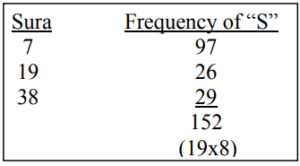
It is noteworthy that in 7:69, the word “Bastatan” is written in some printings with a “Saad,” instead of “Seen.” This is an erroneous distortion that violates the Quran’s code. By looking at the oldest available copy of the Quran, the Tashkent Copy, it was found that the word “Bastatan” is correctly written with a “Seen” (see photocopy below).

Historical Note
The momentous discovery that “19” is the Quran’s common denominator became a reality in January 1974, which since the revelation of the Quran is 1406 lunar years, or 19×74. This is especially uncanny in view of the fact that “19” is mentioned in Sura 74.
Y.S. (Ya Seen)
These two letters prefix Sura 36. The letter “Y” occurs in this sura 237 times, while the letter “S” (Seen) occurs 48 times. The total of both letters is 285, 19×15.
It is noteworthy that the letter “Y” is written in the Quran in two forms; one is obvious and the other is subtle. The subtle form of the letter may be confusing to those who are not thoroughly familiar with the Arabic language. A good example is the word “Araany” which is mentioned twice in 12:36. The letter “Y” is used twice in this word, the first “Y” is subtle and the second is obvious. Sura 36 does not contain a single “Y” of the subtle type. This is a remarkable phenomenon, and one that does not normally occur in a long sura like Sura 36.
H.M. (Ha Mim)
Seven suras are prefixed with the letters “H” and “M”, Suras 40 through 46. The total occurrence of these two letters in the seven H.M.-initialed suras is 2147, or 19×113. See table below:
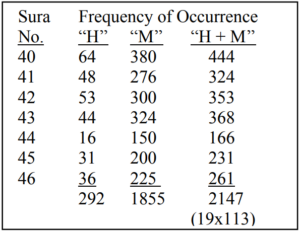
Naturally, the alteration of a single letter “H” or “M” in any of the seven H.M.-initialed suras would have destroyed this intricate phenomenon.
‘A.S.Q. (‘Ayn Seen Qaf)
These initials constitute Verse 2 of Sura 42, and the total occurrence of these letters in this sura is 209, or 19×11. The letter “ ‘A” (‘Ayn) occurs 98 times, the letter “S” (Seen) occurs 54 times, and the letter “Q” (Qaf) occurs 57 times.
A.L.M. (Alef Laam Mim)
The letters “A,” “L,” and “M” are the most frequently used letters in the Arabic language, and in the same order as we see in the Quranic Initials—“A,” then “L,” then “M.” These letters prefix six suras—2, 3, 29, 30, 31, and 32—and the total occurence of them is a multiple of 19. Herein below is the occurrence of those letters counted by Rashad Khalifa:
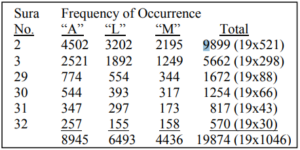
A.L.R. (Alef Laam Ra)
The initials A.L.R are found in Suras 10, 11, 12, 14, and 15, and they are again a multiple of 19, when you add them in all their respective suras together. Herein is the occurrence of those letters counted by Rashad Khalifa:
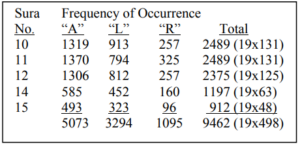
A.L.M.R. (Alef Laam Mim Ra)
These initials prefix one sura, No. 13, and the total frequency of occurrence of the four letters is 1482, or 19×78. The letter “A” occurs 605 times, “L” occurs 480 times, “M” occurs 260 times, and “R” occurs 137 times.
A.L.M.S. (Alef Laam Mim Saad)
Only one sura is prefixed with these initials, Sura 7, and the letter “A” occurs in this sura 2529 times, “L” occurs 1530 times, “M” occurs 1164 times, and “S” (Saad) occurs 97 times. Thus, the total occurrence of the four letters in this sura is 2529 + 1530 + 1164 + 97 = 5320 = 19×280.
An important observation here is the interlocking relationship involving the letter “S” (Saad). This initial occurs also in Suras 19 and 38. While complementing its sister letters in Sura 7 to give a total that is divisible by 19, the frequency of this letter also complements its sister letters in Suras 19 and 38 to give a multiple of 19.
Additionally, the Quranic Initial “S” (Saad) interacts with the Quranic Initials “K.H.Y. ‘A.” (Kaaf Haa Ya ‘Ayn) in Sura 19 to give another total that is also a multiple of 19. This interlocking relationship—which is not unique to the initial “S” (Saad)—contributes to the intricacy of the Quran’s numerical code.
K.H.Y.‘A.S. (Kaaf Ha Ya ‘Ayn Saad)
This is the longest set of initials, consisting of five letters, and it occurs in one sura, Sura 19. The letter “K” in Sura 19 occurs 137 times, “H” occurs 175 times, “Y” occurs 343 times, “ ‘A” occurs 117 times, and “S” (Saad) occurs 26 times. Thus, the total occurrence of the five letters is 798, which is 19×42.
T.H. (Ta Ha), T.S. (Ta Seen), T.S.M. (Ta Seen Mim)
An intricate interlocking relationship links these overlapping Quranic Initials to produce a total that is also a multiple of 19. The initial “H.” is found in Suras 19 and 20. The initials “T.H.” prefix Sura 20. The initials “T.S.” are found in Sura 27, while the initials “T.S.M.” prefix its surrounding Suras 26 & 28. The frequencies of occurrence of these initials are found in the table below:
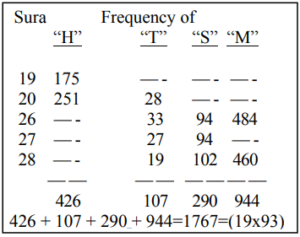
These are the only sets 0f initials which are combined in the count to produce a multiple of 19. Nevertheless, none of them give multiples of 19 individually. Almost 50 years later, Alban Fejza was destined to discover and explains why these three sets of initials (T.H., T.S., T.S.M.) are the only initials which should not give multiples of 19 when counted individually, which is given in Alban Fejza’s explanatory review of the Mathematical Miracle of the Quran.
What Is A “Gematrical Value”?
When the Quran was revealed, 14 centuries ago, the numbers known today did not exist. A universal system was used where the letters of the Arabic, Hebrew, Aramaic, and Greek alphabets were used as numerals. The number assigned to each letter is its “Gematrical Value.” The numerical values of the Arabic alphabet are shown in the table below:
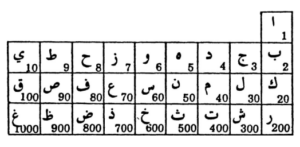
Other Mathematical Properties of the Initialed Suras
Fourteen Arabic letters, half the Arabic alphabet, participate in the formation of 14 different sets of Quranic Initials. By adding the gematrical value of each one of these letters, plus the number of suras which are prefixed with Quranic Initials (29), we obtain a total of 722, or 19x19x2. Additionally, if we add the total gematrical value of all 14 initials, plus the number of the first sura where the initial occurs, we get a grand total of 988, 19×52. See table below for both counts:

WHY 19!
The number 19 can be looked upon as the Almighty Creator’s signature on everything He created. The number “19” possesses unique mathematical properties. For example:
- It is a prime number, which are the only numbers which can be used for such coding, since they are not multiples of other numbers.
- It encompasses the first numeral (1) and the last numeral (9), as if to proclaim God’s attribute in 57:3 as the “Alpha and the Omega.”
We now understand that the universal coding of God’s creations with the number 19 rests in the fact that it is the gematrical value of the word “ONE” (WAHD) in all the scriptural languages—Aramaic, Hebrew, and Arabic. See table below:
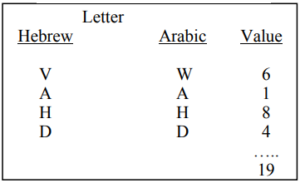
The number 19, therefore, proclaims the First Commandment in all the scriptures: that there is only ONE God.
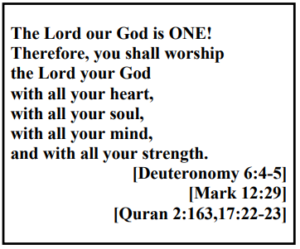
The word “ONE” that refers to God occurs in the Quran 19 times. The reference to God “ALONE” occurs 5 times, and the sum of the sura and verse numbers where we find these five occurrences is 361, 19×19.
The “First Pillar of Islam” is stated in 3:18 as “LAA ELAAHA ELLA HOO” (There is no other god besides Him). This most important expression occurs in 19 suras. The first occurrence is in 2:163, and the last occurrence is in 73:9. The total of these sura numbers, plus the number of verses between the first and last occurrences, plus the sum of these verse numbers is 316502, or 19x 16658.
The Word “Quran”
The word “Quran” occurs in the Quran 58 times, with one of them, in 10:15, referring to “another Quran.” This particular occurrence, therefore, must be excluded. Thus, the frequency of occurrence of “this Quran” in the Quran is 57, or 19×3.
Two other grammatical forms of the word “Quran” occur in 12 verses. These include the word “Quranun” and the word “Quranahu.” One of these occurrences, in 13:31 refers to “another Quran” that cause the mountains to crumble. Another occurrence, in 41:44, refers to “a non-Arabic Quran.” These two occurrences, therefore, are excluded. The table below shows a list of the suras and verses where the word “Quran” in all its grammatical forms, occurs.
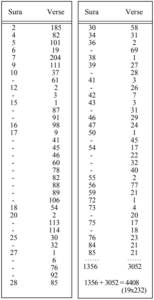
A Witness From the Children of Israel [46:10]
Verse 46:10 in the Quran says, “Say: “What if it is from God, and you disbelieved in it? A witness from the Children of Israel has borne witness to a similar phenomenon, and he has believed, while you have turned too arrogant to believe. God does not guide the wicked””
The following quotation is taken from STUDIES IN JEWISH MYSTICISM, (Association for Jewish Studies, Cambridge, Mass., Joseph Dan & Frank Talmage, eds., Page 88, 1982). The quotation refers to the work of Rabbi Judah the Pious (12th Century AD):
The people [Jews] in France made it a custom to add [in the morning prayer] the words: “ ’Ashrei temimei derekh [blessed are those who walk the righteous way],” and our Rabbi, the Pious, of blessed memory, wrote that they were completely and utterly wrong. It is all gross falsehood, because there are only nineteen times that the Holy Name is mentioned [in that portion of the morning prayer]… and similarly you find the word ’Elohim nineteen times in the pericope of Ve-’elleh shemot. . . . Similarly, you find that Israel were called “sons” nineteen times, and there are many other examples. All these sets of nineteen are intricately intertwined, and they contain many secrets and esoteric meanings, which are contained in more than eight large volumes… Furthermore, in this section there are 152 (19×8) words.
